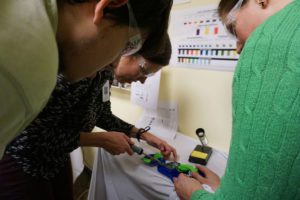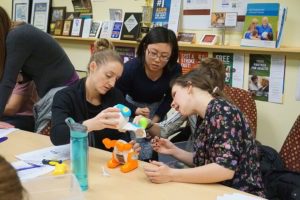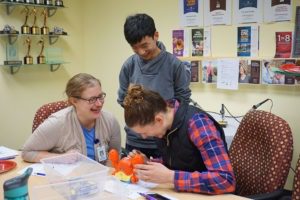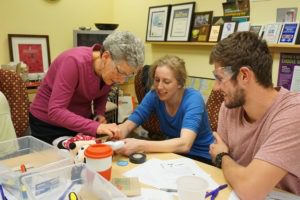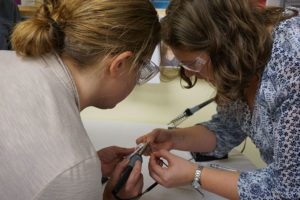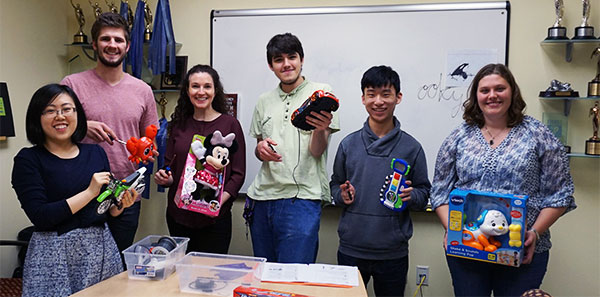On November 29, the WHAT! (Washington Has Adapted Toys!) Bioengineering Honors team trained 9 clinicians at UW Valley Medical Center’s Children’s Therapy in toy adaptation for children with disabilities. Toy adaptation involves modifying battery-powered toys to be activated by an accessible switch.
The WHAT! (Washington Has Adapted Toys!) Bioengineering Honors team is comprised of BioE seniors Roujia Wang, Alexander Novokhodko, Philip Lee, and Moritz Lange.
The students describe the event as “monumental” because the toys adapted during the event and in prior training will be used to establish an adapted toy library, where families can check out toys for their child’s use on a trial basis, at Valley Medical Center. To date, there are no adapted toy libraries in Washington state – a need that gave rise to the team’s name.
“The students are mentored by Dr. Dianne Hendricks, who teaches the honors seminar, mentors all departmental honors students as they complete year-long service projects, and is the faculty lead for Bioengineering Outreach. First year Bioengineering Ph.D. student Molly Mollica, who helped launch the Toy Adaptation Project at Ohio State University, also mentors the honors team and is collaborating with Dr. Hendricks on outreach activities involving toy adaptation.
In addition to the obvious altruistic appeal of toy adaptation, Dr. Hendricks and Ms. Mollica point out that toy adaptation teaches students the importance of universal design, which is the creation of products and environments that are accessible to all people. It also provides an opportunity for students to learn and teach engineering skills such as soldering.
Dr. Hendricks notes, “This is a meaningful and high-impact honors service project. In addition to learning how to adapt toys, which benefits the students in a number of ways, now the students have trained clinicians who can teach others – including other clinicians and families of children with disabilities.”
Throughout the academic year, the honors students will continue to make a significant, positive impact through future outreach events. For the Holiday Toy Hack on Sunday December 11, the honors students will train 20 student volunteers and then guide these students as they help small groups of UW and community volunteers, including families with disabilities, adapt toys that will be delivered to local children with disabilities.
“The honors students have done a tremendous job, and we are very fortunate to have Molly’s expertise,” says Dr. Hendricks. “It is such an honor and a privilege to combine my passions for teaching, mentoring, and service in projects like this!”
The clinician training and Holiday Toy Hack received support from an AccessEngineering minigrant awarded to Dr. Hendricks, with co-directors Molly Mollica of Bioengineering; Dr. Anat Caspi, director of the Taskar Center for Accessible Technology; and Dr. Heather Feldner of Dr. Kat Steele’s lab in Mechanical Engineering.
